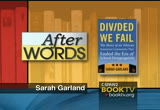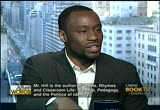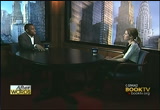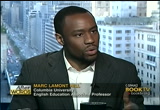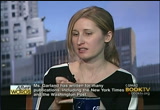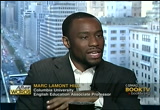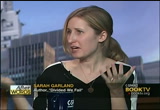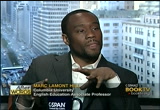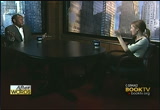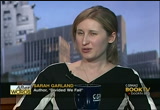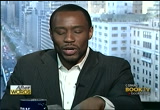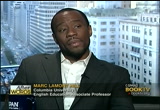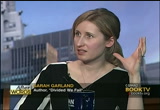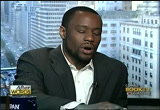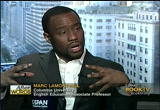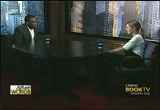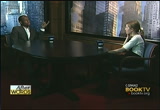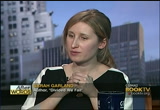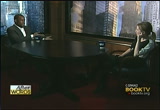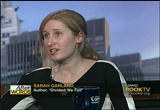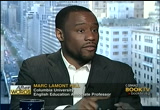tv Book TV After Words CSPAN February 18, 2013 12:00am-1:00am EST
12:01 am
so that spurred me to think about these issues. the reason i wrote it, i'm from louisville. i grew up going to the public schools there and i was -- when i was in the second grade, was in the inner city, one of the poorer neighborhoods in the city. so it was something i thought about since i was a little kid. and so when the case went to the supreme court, i was obviously very interested in following it because it was personal. >> host: talk about the personal connection. i always like to ask that before we get into the meat of it. when you were busing to the inner city, did you have a particularly stance on the question of desegregation and school integrace. >> guest: when you're a kid you don't thing about it. when i was reading at the reaction of the kids in the the
12:02 am
'7s when they started buzzing -- busing, a lot of the kids were saying, i like this school, and as i got older i started to think about not only going to schooled and being surrounded by poverty i didn't see in my neighborhoods in the suburbs, but then the school is attended, there was tracking so you had the regular program, honors, and then we had advance programs, and those were cut very closely along race and class lines. so as a kid we absorbed that and started to think about it, and i remember being in high school and one of the only classes i took -- honor classes i took where it was mixed in the tracks was a global studies course and there was an african-american girl in the class and she said stushie tried to test and
12:03 am
couldn't get in. and that really stuck with me. i still remember that. tenth grade. thinking about these tracks. and you had desegregation but in the school you still had segregation and they're sending a message to kids when you have classes of white kids that are she that kids and classes with black kids and they're not the smart kids. and myself and a lot of my classmates, that makes you think about how this has worked out, and i've always been really interested in this idea of how do we do diversity well? >> host: the dominant narrative in american life, and particularly legal educational history over the past 50 years, 60 years now, has been the bankrupt decision. this idea that if we could desegregate and force the hand of schools and policymakers, we
12:04 am
could have a more diverse school, a greater educational not just equality but equity. obviously your book pushes back against that narrative somewhat. at least people in louisville do. but the brown vs. the board is in the background of the book the entire time. what has brown meant to educational equality and access in the country. >> it's hard question. we hold up brown as this amazing feat, they we rolled back segregation and then we look back at what happened afterwards and see how incredibly difficult it was, divisive in some ways and also you had this very incremental progress after that. it was frustrating to people, and so it is seen as a great victory but i think also it's important -- looking back and seeing what we didn't accomplish
12:05 am
yet. and so when i was looking at desegregation and how it was finally implemented 20 years later after brown was handed down, 20 years later you start busing. then the way the program. s are set up, still maintains white privilege in a lot of ways, and class privilege, so that poor kids and black kids had to be bussed for more time. part of that was logistics and part of is was maintaining the status quo so you didn't have white flight. so the brown decision, it's a difficult decision. one of the most interesting books i've ever read what's brown v board of education should have said, academics can -- academicking looking if it was done differently, how it might have changed things. you probably wouldn't have had the unanimous decision, which was very important, but it's very interesting to look at the
12:06 am
counterfactual and think what a victory was and what it didn't accomplish. >> host: is it difficult to write a book that pushes back against such a celebrated public policy? really considered one of the great victories of the 20th 20th century for americans. did you get any anxiety about pushing back against that or highlighting the story of people who pushed back? >> guest: oh, yes. this is not the book i expected to write. i went into it thinking that -- i think in louisville, especially, the integration was a good thing and it brought people together. it made me think differently about the world than i might have otherwise, and a lot of my classmates in the same way, and i think one of the points i make often in the book is that you -- during the heyday of desegregation and busing in the '7s and '80s, you actually saw the gap shrinking faster
12:07 am
than it ever has. so that a big deal, and i think there were accomplishments -- >> host: the announcement of the desegregation as such or do you think that was by accident? the gap was so huge that just getting access to books and resources and consistency, a building, may shortened the gap. many argue the actual desegregation process was incidental. >> guest: at it hard to separate that out. when you talk to people who researched how does integration affect kids, it's hard to say. is it because kids are learning from each other or is it because if you're a black child in a classroom with majority white middle class, you might have in more resources at that school than you would otherwise have. so one of the people i interview in the book, his favorite saying was, green follows white.
12:08 am
that's why he supported desegregation at the time. so, i think that's a really difficult, complicated question, and there's also a lot of other things going on at the time when the gap was closing. it wasn't just desegregation. i think it was a very important thing to do. but i did -- i was surprised i ended up writing this book that was looking at what went wrong. >> host: but it's jarring. you open up the book and first section is about these letters, and i found it compelling as you tell the temperature of this girl who dreamed of going to central high school and she dreamed of it all of her life, and all 15 years of her life. but she essentially what was told she couldn't go because of racial quotas and the school cooperate have more than 42% african-american so as a result she was put on a wait list that might derail her dream of a good
12:09 am
education and becoming a lawyer. these are telling cases or a consistent narrative of people. >> i think those stories to me were what made it really interestingful it's how emotionally connected people felt with the school, with central high school, which is what the book focuses on, and how they saw this teacher in that school. part of it was she wanted to be a lawyer, and the city had a law program. but it was also very emotional familial connection. her dad and mom had gone there. it was the black school in louisville for decades and decadeses. so people had a very emotional connection it to, and it was a very good school. at the time, in the '80s, eventually they nut an advanced program there, so you had the elite of the black community going to that school.
12:10 am
so, people -- the people i talked to in the book, it was -- there's two things going on, this concern about educational quality but also about our school, and this is our community, and it's very important that we have some say and some entitlement of our school. >> host: has people got those letters -- as people got the sense that the engineering of the 1950s was producing outcomes that may have been unintended but nonetheless harmful. how soon did people in the town realize they probably needed to make in sort of adjustment, some sort of policy pushback. >> guest: she desegregation it negotiated over the years. there was lots of fights, this sort of ongoing constant conflict in some ways. and so i think that for some people, activists, who were
12:11 am
behind the fight, and hey had gone to central predesegregation, and felt very connected to the school, and so for them ahead been watching this and they were really concerned that desegregation was ogoing to close central. they saw the writing on the wall because so many other black schools had been closed. >> host: whoa would it close instead of shift dem graphically? >> guest: it happened a lot. it happened all over the south. and elsewhere, where to make busing work, you had more schools more places than you needed. because you split the population inch north carolina there theree these two schools, a black high school and white school, and when they had to dough desegregate they closed the black school.
12:12 am
so in louisville they're trying to get the parents not to flee the suburbs and they had to convince them to keep their kid and public schools and the think ing was they're not going to want their kids downtown, and a lot of the schools had been underresourced and were falling apart. so it made sense to close them because we haven't been putting a lot of resources into them for a long time so shut them down. it was partly just to make it work. i think logistical, but also some, how do we maintain -- how do we keep the white middle class happy. >> host: the activists, based on the argument, might have been okay with them for the fund 'but the stability of the community. they were fighting for central for other reasons,. >> guest: it was a tradition of
12:13 am
black empowerment, i think and that we built this school ourselves, that we did this largely without a lot of help from the school district, without other lot of resources. we had to fight for every penny. and i think a lot of the people i talked to saw the way that busing happened, just the attitude of desegregation, saying that black people basically failed, and with education in the community and they need to have their kids sit next to a white kid. i heard that a lot. so there was a sense -- >> host: from the community or the out critics? >> guest: i heard that from the activists. we shouldn't have to sit a black child next to white child for them to learn. and i think there was an
12:14 am
understandable frustration that we're being seen as deficient, and our culture and our community is not being recognized as as good as, and i think that was one of the problems with the way desegregation was thought of and the way it was implemented there wasn't a sharing of resources having it's, wearing going to help you. >> host: there is any danger in that approach? that could return back to the 19554 mindset of saying we're going to hold on to the -- pre1954 -- going to hold the schools so we can say we have our own staff, almost nationalist kind of posture irrespective of the outcome for the kid. >> guest: i agree. i was telling the stories of people whose stories have not been told or perspectives have not been out there. i agree. it's a really difficult question to say, do we -- it's a question
12:15 am
that we are dealing with now, do you close a school down because it's failing or because it doesn't have enough students? and because it's -- test scores are low, or do we try to keep i together, even though those things are happening, sort of sickens the community and it's a real difficult balance and i don't have the answer. >> host: none of us do. but i think what's interesting, one of the real virtues of the book which is amazingly written, is you chronicle this perspective. you highlight this perspective, but you also help us track how the activists engaged in the pushback. often times i think the victory -- these victories are celebrated but people don't really get a sense of the footprint, what steps they took to get there talk about that. these activists that pushed to save central and advanced the
12:16 am
legal argument, shifted the tide for the entire country. how did they do it? >> guest: well, there was really a bunch of very interesting and eclectic people but they came at it from different -- very different places. although a lot of them had been friends from -- one of them was a very gregarious football coach and he had been a gadfly, and had writtennedder toals to the newspaper, and they kind of knew what they were doing when it came to community activism. another had been part of the black nationalist movement in the '70s and was involved in that. so they'd grown up from that and they were of the civil rights movement in some ways, of that time period, but also sort of on the outside and critiqueing it but learning from it.
12:17 am
they knew what they were could go. fran thomas is one of my favorite people, just a wonderful lady, and she was -- she got very involved in protesting the first iraq war, in the '9s, and she was very involved and that is how she got pulled in. because she wanted to save the school she had gone to. so they knew what they were doing but they were also very alone. they were a minority in their community in a lot of ways. it was an a knack -- -- an african-american fighting against desegregation, which makes it interesting, which is why i wrote a book about them. >> host: imagine how they can get to the supreme court. how do you as a black person -- in the black community convince black people that getting rid of
12:18 am
white people -- is the best way to make schools better. >> guest: the thing is, there were alone in bringing this first. they were behind the first federal case. and they didn't end up going on to the supreme court because they won their fight, central high school. that's what they cared about, and some white parents took it on. but when i was doing the research it turns out in a lot of places you had fights or you had the naacp on one side fighting to maintain desegregation programs or expand them and then you would have a black school board member or urban league person or a group of black parents on the other side, let's get rid of the busing program. we want our neighborhoods back. so they were lonely but not completely alone. >> host: also fighting against the power brokers, and i guess i
12:19 am
wonder -- maybe you can answer this in the course of your subjects -- i wonder if organizations are holding on to this because it makes policy sense, they have a commitment to desegregation works, it's enthing, or if they're holding on to a tradition. the naacp in many ways makes its bones politically on brown v board. did you get a sense that people were resentful of the black organizations for the stance they were taking in. >> guest: yes, in some ways. it's interesting in louisville, for example, fran on the board, and i think that it became -- you didn't have a huge uprising in louisville when they were
12:20 am
bringing this case you. didn't have a lot of black leaders in the community. you had -- definitely had a significant -- some of the leaders saying, this is the wrong thing too toe do aboutout didn't have a big uprising against them. i think they were -- people in the community said, yeah, this hasn't really again our way. but it is an interesting question, and i don't know -- >> host: i mean, i often wonder, and after reading your book i game more compelled to question the reasons why this organizations leak the naacp or maybe the urban league in some areas, if not nationally, certainly a local level -- have 'opublic policy with the ceremony symbowl lick value but don't necessarily play out on the ground for the people who are supposed to be helped. yes. i think they're so -- in some
12:21 am
ways there's a need for our schools to be more diverse than they are. maybe not an academic need but there's this idea that if we -- if our candidates are educated together, maybe our country will be less divided than it is politically, economically, maybe we can understand each other better. so i think there's a reason for it not just a tradition but i think -- >> host: a resource question. >> guest: yeah. and how do you get money into poor minority neighborhoods? well, one really fast way to do that is, for example, in new york, if you have a gentrifying community. [overlapping speakers] >> guest: i think that's what the educational system is trying to do, trying to say, okay,
12:22 am
we'll desegregation -- didn't work or it's mostly over in most places. so how do we deal with that? how do we deal with the fact that in most cities and urban areas it's not even a possibility. it's not even feasible anymore. >> host: popular opinion based on the legal turns we have seen now where race -- >> guest: i think legally, you can't really -- it's very hard to -- there's this -- i write about the school choice movement, and i really think that's gone into the consciousness of the american public and people feel like they deserve the right to have a choice of schools. and so i think turning around and saying, okay, we're going to implement a busing program and you have to send your kid here, you have huge outcries, don't think it's it politically feasible in that way, and in louisville, it's a controlled choice. it's a choice program but the choices are managed.
12:23 am
so i think that has sort of undermined any opportunity to do this, and just in terms of where people live. i think you have had the growth of cities and in some weighed it's making -- some schools are becoming more -- in the suburbs you have neighborhoods becoming more diverse and the inner cities you have the white middle class moving back in and a lot of -- in new york. so there's some opportunities. but i don't think -- busing won't be it. >> host: i'm glad you mentioned that. if the sort of demographic landscape has shifted so much that it almost makes no sense to even sort of rely on the kind of policy moves in the 50s and '6 0s. means very different, using new york city as an example. brooklyn or harlem look so different now, even in the
12:24 am
'90s. i guess part of what i wonder, because i'm so interested in the past, before we change gears, is if the past had taken account of those kinds of shifts, the policy shifts and demography shifts and making demands for new approaches to educational reform are they factoring that stuff in or are they locked in as well? >> guest: i think whatever you talk to parents they just want to know -- i hear people talk about parent involvement in schools, and parents are really focused on their kid, and what is going to happen to them and getting them into the very best school they possibly can, and some parents have more savvy than others in fishing out which school that is, and some people value different things about schools. being close to my house may be very important, or the teachers are nice to me and care about my
12:25 am
kid, that kind of thing. so people weigh different -- i think parents weigh different things. but in all of the people i talked to in louisville, the parents, that was their motivation. they weren't thinking about, oh -- i mean, even crystal took her case to the supreme court. her motivation was she wanted her son to get into the school she wanted him to go to. so wasn't really, i want to tear the system down. that's not how she started out. and i think for the most part that was the same with the parents. we weren't thinking big picture, thinking very small picture. my five-year-old. >> host: becomes pick -- big picture. >> guest: that is what is so difficult about school reform, you have these clashes and it's really hard to think about the larger society -- the good of the larger society when it's
12:26 am
your child. and i think in my personal case, my parents sent me down to the school -- my mother had spent time in the school where i went to elementary school, before busing. she was familiar with this school and she tide not have a good -- she was there as a social worker. it was a rough school. it was a high poverty area, and so when she was sending me to that school, i imagined it must have been difficult but at the same time it had been -- they had really, i guess, worked on the school to make it palatable for middle class families, so they had this advanced program, and that made it okay for my classmates and i to go there. and stay there i was only dish only had to go there for two years and i stayed for four because it was a good program. and so i think our parents could
12:27 am
say, it's a good thing because we're taking part in busing and we're sending our kids, but at the same time it was also a really good program. >> host: then the program died? >> guest: that's -- my elementary school -- >> host: in terms of the did he go desegregation. >> guest: louisville is pretty -- there's not very many school districts around the country -- i looked at a study that looked how few, 200 something still doing desegregation, but louisville is still doing and it just reelect a school board that was supportive of doing desegregation. they had to fiddle with it because they can't use race because of the supreme court decision,they're using income and other factors, and race as a -- >> host: in louisville, in particular --
12:28 am
>> guest: yeah. you look at the -- i think the lawyer who is involved in bringing this case got so angry when they drew up the new plan. they sort of drew two areas of the city they were going to invest back and forth between, and the black areas and the white areas. so it's very clear. and i think part of the frustration was that -- with that and part of the frustration with the program is you had busing going on and integration going on between poor black students and upper middle class white students, but then you also had black students living in somewhat middle working class neighborhoods, being sent to very poor white neighborhoods, which is something in louisville, in kentucky, isn't make more of a factor but you have a population of low income and working class whites, very large population, and had very
12:29 am
high poverty schools. so it was perfectly integrated racially but every kid in the school was poor. >> host: which create its own problems. >> guest: doesn't necessarily solve -- i think it's important for those kids to know one another but it doesn't necessarily solve the resource problem. >> host: which speaks to other issue wes have to take seriously. i want to talk about all of that stuff. we're going to take a quick break. >> okay. >> host: the book talked about desegregation and ultimately the parents frame it as a policy
12:30 am
that failed. talk to me.the reasons why. >> guest: i think they were so frustrated because they were implemented ended up undernining what black people wanted for their schools. so you had hundreds, thousands of black teachers fired, as busing was implemented, and then it's obviously not what people were looking for when they were fighting for this -- for the desegregation of schools. and like i said earlier, that was to make way for bringing white kids and black kids together and not scaring white parents a. from the schools. >> host: i want to unpack this. the argument about that is the black schools are fine for -- but white people, white parents would descared away bay black teacher.
12:31 am
>> guest: that's what happened and i think you had mergers that happened, louisville and the county system merged. you had the school closures. but i do think that was part of the thinking, and also you had -- there's situations in louisville that i write about where a school is going to be closed -- a white schools, and the parents raise hell. and they kept that school intact, even though -- so those parents had clout and political savvy, and i think that had something to do with it. and black principals were fired and administrators. so you had this fallout that i don't think people anticipated. and -- >> host: how did they not foresee this. i read the book and i thought, how did people not foresee this? a finite number of resources. more teachers than you need.
12:32 am
there could have been an expectation of fairness, we have a seniority system, but in the 50s and 60s and 70s, far more reasonable to anticipate that black teachers would be fired. was this not foreseeable? was it naivete or were they sold a bill of goods? >> guest: i think for at least for the lawyers, my understanding is they just want -- this just needed to happen. we just needed to get rid of this dual system of education because it was so much more unfair than what -- having these two systems with different salary scales for black and white teachers, which is the case before desegregation, where you had -- you actually had -- you couldn't have any integration between faculty, and you had second hand -- you had to get rid of that. so, i think -- i don't know -- i have no idea if people foresaw -- i would imagine that
12:33 am
you actually had in the south -- you had some ambivalence about this. i think that some black people saw that this is potentially going to hurt my school, or i'm going to lose my job. if we have to integrate with the white school because they're not going to want me teaching their kids. and there was an interesting poll -- some polls done. they're not very reliable but they're interesting in that they showed right after -- brown v. board -- some people thought it was an important -- getting rid of the segregated schools was worth the risk. i don't know. but that was -- it had this fallout, and i think maybe it could have been anticipated, but there is -- in mobile,
12:34 am
especially, there were reports done and you had civil rights activists, actively saying and tracking this and saying, look how many black teachers wi had and how many we have now and how many we used to have. so, people were pointing it out at the time. >> host: i guess a subtext of your book -- maybe i'm reading too much into it. please tell me if i am imi do that a lot -- that black activists, black policymakers, advocacy groups are constantly chasing symbolic victories at the expense of real policy victories. it seems to me this was foreseeable, and as you indicate, all signs were there. but the end of legal segregation was such an important symbolic victory, maybe not just for black people but for america -- brown v. board is such an extraordinary symbolic victory, that all these other residual effects are really collateral
12:35 am
damage. as you had said, were worth it because we ended legal segregation. is that a fair analysis. >> guest: at it hard for me to see. everytime you look at the issues there's feasibility versus -- there's the dream of what could be, and then there's like what is practical? what can we do? what's politically possible? and what was politically possible in the 50s, it obviously -- brown v. board had a lot of other ripple effects i think were a big deal and were very important. so, i don't know if those calculations were made and they said we're not going to get everything we want but we'll at least get this big symbolic victory. but i think weighing the differences, i think it was still an important factor.
12:36 am
i'm not going do say it wasn't. >> host: i have to read your book and see. not that it wasn't important but it wasn't good. >> guest: it didn't work like it was supposed to work i think is what happened itch think when they were fighting, there was this stream, this is going to open up the doors for black children and white children be educated together, and they were all going to finally share resources, and there was limited progress, but still today, you can look at the resources that minority schools have and compare them to the suburbs and you see human disparities. >> host: there's another piece of this. part was the collateral effects of liquidating schools in terms of teachers. but there was also the community effect.
12:37 am
in your book you talk about how people were pushing back not just because teachers were fired and all that stuff. and that just baas programs were lost, although that was important as well. but that communities were broken. the communities were actually fragmented. >> guest: right. i think that is one of the big issue that people talk about, is your neighborhood school, and i don't have an experience of a neighborhood school so i don't really get that. because i didn't go to a neighborhood school. my school was -- i loved my elementary school, and -- but that was a very important to people and they really -- >> host: what does a neighborhood school, within that perspective, offer a community? >> guest: well, i think especially looking back at the hoyt of southern black education, there's this deeper pride in a lot of the schools built because it started out that these were -- black
12:38 am
education in the south started out in people reside homes and churches -- in people's homes and churches and it wasn't something that white society said, here's your school. the black community built themselves in a lot of way. and they got some help from philanthropieses in the north but there was a lot of pride. so i think this is more than just the school down at the street where i send my child and at it convenient to me house and all my neighbors send my kids there and we can hang out at the p.t.a. meetings. this is, we built this. this is our pride of the community. >> host: symbolic. the symbolic is trumping the practical in policies. >> guest: i think -- i think symbolic matters. i think that it matters to people. it's about your identity and who you are, and this is just -- in the book it's like people
12:39 am
grappling with, am i american or am i african-american and how do you deal with assimilation and success in a larger society, and still maintaining my history and identity and that's at the hart of what a lot of people are grappling with, how much of that identity and culture do i have to give up in order to succeed in a larger society. so i think there's symbolism there and also these deeper questions that i think are really important. >> host: absolutely. part of how people hold on -- if i'm interpreting you book -- hold ton the sense of the collective and the community identity is through having a stable, somewhat dense even community of people that included middle class people, working class people, the rich -- not rich but upper middle class people, the professional class and the blue
12:40 am
collar class all in the same neighborhood. expect that not an argument inclusive-door exclusive too your book. the black folk were leaving the other way, as soon as they had a chance to leave these neighbors. >> guest: absolute limit my previous book when i was looking at gangs, i was looking at suburbanization, and it is interesting, the rates of black flight are much bigger. the numbers are smaller because there's fewer but people are running out of the inner city. >> host: nobody wants to live there. that's the argument. if there's no schools, if there's food insecurity. if there's crumbling housing, opportunities, black people don't want to live there either. so they leave the first chance they get. but the course argument -- the counterargument is that's why we have too stay and rebuild the most responsible, the most
12:41 am
disciplined, if they all leave then the neighborhood -- same thing with school choice argument. the best plan is to take your kids to charter schools or private schools or home school option. so, to that extent, your book makes a pretty persuasive argue. , whether you intended to or not, that this is not a good thing, because we're taking the best people and letting them go to could elsewhere. i yes. i'm a journalist, i'm always careful about the argument but i do think there was this very detrimental fallout, and the answer is not to just not have desegregation -- not to have lifted segregation laws and jim crow. obviously that's not the answer. i think there were federal policies that made it attractive for people to move out of the city and into the suburbs and took apart these vibrant city
12:42 am
neighborhoods that used to exist with mixed income. so it wasn't just individual choices, let's all move to the suburbs, all of a sudden. this is a federal policy choice, and local policy choices to make this easy for other people who have the money to get out to get out. so, i think that there was issues but i don't think -- it wasn't just desegregation. there's a lot of other things that went on to facilitate what went wrong so if desegregation didn't fix the achievement gap. it helped probably. it also didn't cause all these problems, but it was one of the factors. >> host: it's a complex thing and i think your book really spotlights that complexity in a masterful way. talk to me about the supreme court. that becomes -- you mentioned
12:43 am
while this was rooted in grassroots activism, black parents advocating for. thes and their school, central high school. ultimately becomes a supreme court that changes the complexion of the nation. really kind of ends desegregation. >> guest: yes. it got out of their hands. i think they hired a -- they couldn't find anybody to be their lawyer, so they found this guy, teddy gordon, who is a very interesting guy. he was very enthusiastic. he this as a great opportunity and he was compelled by their story but it was then taken up by white parents to sort of -- wanted to send their kid to this school and cooperate because of the race. so they took it to the supreme court, and it was a big deal in some ways. it sort of was also just kind of a book end to something that was already happening. so even when that decision came down, most school districts in the nation weren't doing busing anymore. so, in some ways it was just
12:44 am
sort of an official end, but to something that had already one waning. >> host: but did allow for a conversation about the role that race plays in public policy. that still matters now. the same tile this is happening we have affirmsive action debates and wrestling with the question, what role race should play. the supreme court essentially codified it a trend towards saying race can't be the only factor. can be a factor but not the only factor so what are the other factors that can now play, based on the supreme court decision. louisville they have been creative with education, and the allergy. is they're just using proxies for race because at places like louisville you have dnr you -- have -- you can look at race and poverty levels and they tend to coincide. the big idea now is that we
12:45 am
should be looking at socialow economic status and using that as a basis of integrating schools at the k-12 level -- and this is a big conversation happening in higher ed as well, rather than affirmative action, which tends to -- opponents say it creams the best and the brightest. we should be using class instead because you have so few persons attending universities. >> host: you could end up in a place like louisville with a bunch of poor white kids in one school and poor black kids in another school. >> guest: yeah. that's the complaint all along. that you had -- still had high-poverty schools, but -- i think it's a compelling case. i think the people who say that race still matters, say that, yes, income can capture and can
12:46 am
be a proxy for making sure we also have racial diversity, but racial diversity matters because people come with different experiences. >> host: for its own sake. >> guest: yes. they argue it matters and the experience of race is not -- is more than just about income. so for black americans, for example, the wealth gap is much harder to measure, but you may have differentiations in income, for example, but wealth is a different matter if that makes sense. >> absolutely. income being the annual income. >> guest: that's harder to capture. so i think the argument is that those experiences -- they really are caught up in the history and -- the history of discrimination and history of segregation that -- and the
12:47 am
continued institutional race simple in this country, that those things are not captured by just looking at class. so that's the argument for saying we still need to do affirmative action, or choosing schools based on race. >> host: do parents see the value in senate i understand the nationalist argument, the argument we want to protect our schools. we don't want to lose this legacy, but was there a vision within the community that mirrored the arguments of the liberal elite whose say -- at least the academic lane'll eay lead0s who say we most value diversity. there's something good in a school about having blacks and whites and latinos in the same place. sort of the sonia sotomayor argument. >> guest: it's interesting because the two families i am focused on, deion and glen and
12:48 am
jacqueline and jamica, the mam and the daughter in each case had different opinions. and jacqueline's case, she had had this horrible experience when she was bussed in the '7s so out to this white working class, fairly high poverty neighborhood out in the outside of louisville. kids spitting at her. throwing snowballs with rocks, an awful experience, and had been really nervous about sending her kids when they had to bussed eventually. but they had a good experience so she changed her mind if. she saw this is important. my kids have had opportunities they would not have had if they had gone to at the school across the street, which was still, despite busing, still a struggling school. and so she -- when we talked
12:49 am
about it, she really said, you know, these opportunities were important and they met people and had these networks, and experiences, that they wouldn't have gone camping, i wouldn't have billion able to do that for -- i wouldn't have been able to do that for them. so with that said, jamica, her daughter, had really good experience and ended up going to school actually near my neighborhood. we switched places at different times. she had good experiences but also felt the racial quotas were inherently wrong and didn't matter. she should be able to go and have the same experiences down the street from her house. so, it's just -- >> host: probably policymaker who we woo disagree with that. both political sides want all schools to be choice schools and all schools equal,.
12:50 am
>> guest: easier said than done. >> host: your book offers such a powerful critique of desegregation. not -- talking about how it has perhaps been oversimply identified analysis. it works or doesn't work. but talk to me about what does work? you pick up this book and they are going to have strong responses. for example, one response -- i read a review that said they interpreted your book as saying that too much government is bad. the government intervention is the problem. >> guest: hmm. interesting. >> host: but it's reasonable to interpret your book that way. right? one could say, conservatives, maybe even libertarian, wait a minute, this is what happens when government keeps tinkering and engineering, they trytake make us equal and as a result we end up hurting the very people we are were trying to help. this is what happens when government gets in the way. >> guest: yeah. it's not necessarily what i was
12:51 am
trying get across. [laughter] >> host: but it's not -- >> guest: i think that the issue with that is who is running government? and who is -- for whose benefit? that's what ended up having with desegregation. the problem is the decisions were being made for the most part with a certain constituent tune si in mind and keeping dd constituency in explained keeping them happen and wasn't just they white middle class. we're trying to keep the black civil rights liberal who fought for desegregation happy, too, and there was that contingent in louisville fight for desegregation very intensely all these years as well. so, yeah, but in terms of what works, i think -- i listen to
12:52 am
lots of people every day talking to me about what they think will work. and i don't have an answer to this. i spend a lot of time in really good schools that seemed to be working, and there's always something that is problematic with how -- why it's working so well. and so i think it's a really hard question to answer. one of the things i'm interested in right now is this effort to do school choice and diversity at the same time, which is a new trend. so this is something that charter schools operators are getting interested in, and here in new york city, for example, but also elsewhere in new orleans, they're starting the charter school where the purpose is to create diversity. you would think that everyone would say, wow, school choice and desegregation. it's voluntary. but there's some huge
12:53 am
controversy. >> host: is it the creaming argument? >> guest: part of it is that and part of it -- it's just an anticharter school argument, that people don't -- why don't you come in and work on the schools we have, versus opening a new school that will take -- cream the students who are doing well and the parents -- >> host: creaming is the idea that the most high parental involvement will be taken off the top and go to the other school leaving the traditional public school to have what left. >> guest: exactly. exactly. that's the main issue, but in one instance i went to really fascinating school in atlanta where they had built -- it was planned community where not only was the school -- it wasn't completely -- it was becoming more diverse, but they had created a school that was in this community -- the issue was
12:54 am
they had to tear down the projects that were there before hand and a lot of'em who lived there didn't get to stay. >> host: that seems to be consistent as well. eave reform often accompanies dislocation of something. so i rant an idea by. i said a person could read this as the consequences of liberal democratic tinkering, when you try to appease everyone. i could say we rejected that argument out of hand. at least the argument of your book. another argue; this is exactly why we need school choice and the most liberal as possible. i mean the sense we should let as many options flow as people. people should have access to vouchers and go wherever they want to getting a set to good education, we should increase funding for home school options and chart are school movement should become privatized. there's that argument as well. would it be fair to interpret
12:55 am
your book as to why we need school choice option? >> guest: i don't think so. i mean partly because what i think -- i think choice is not a bad thing. think parents want it. i think kids are benefit from different learning environments and parents know best what would be good for their kid. one of the issue with school choice is the issue of equity, and if we care about equity and we care about providing a good option for eave child, there are the candidates -- the kids out there who don't eave a parent that will be able to navigate those choices and you found that in new york city as an example, where for high school there are hundreds of choices of schools you can go to. but you found that the large comprehensive high schools that are just a regular high school, those are really -- a lot of
12:56 am
those have struggled because they tend to get the kids who don't make an active choice, if that makes sense. so just like desegregation, there are problems that come with it, that i think that need to be dealt with and thought about. and i think we can look back at desegregation and think, this worked and this didn't work, and really think about those. not critiqueing a school choice, and the other reform ideas that are happening now, but a way to make them better, at least more thoughtful, and at least try to avoid repeating some of the same mistakes. >> host: bait i read your entire book and you have not solved -- >> guest: not yet. maybe my next book.
86 Views
IN COLLECTIONS
CSPAN2 Television Archive
Television Archive  Television Archive News Search Service
Television Archive News Search Service 
Uploaded by TV Archive on

 Live Music Archive
Live Music Archive Librivox Free Audio
Librivox Free Audio Metropolitan Museum
Metropolitan Museum Cleveland Museum of Art
Cleveland Museum of Art Internet Arcade
Internet Arcade Console Living Room
Console Living Room Books to Borrow
Books to Borrow Open Library
Open Library TV News
TV News Understanding 9/11
Understanding 9/11